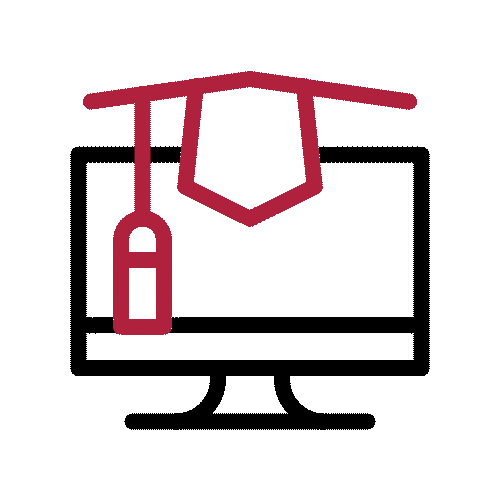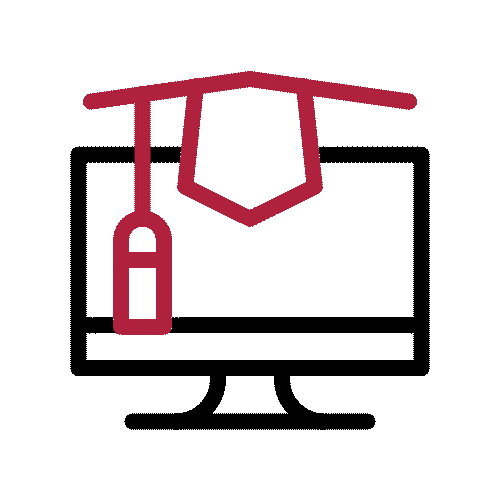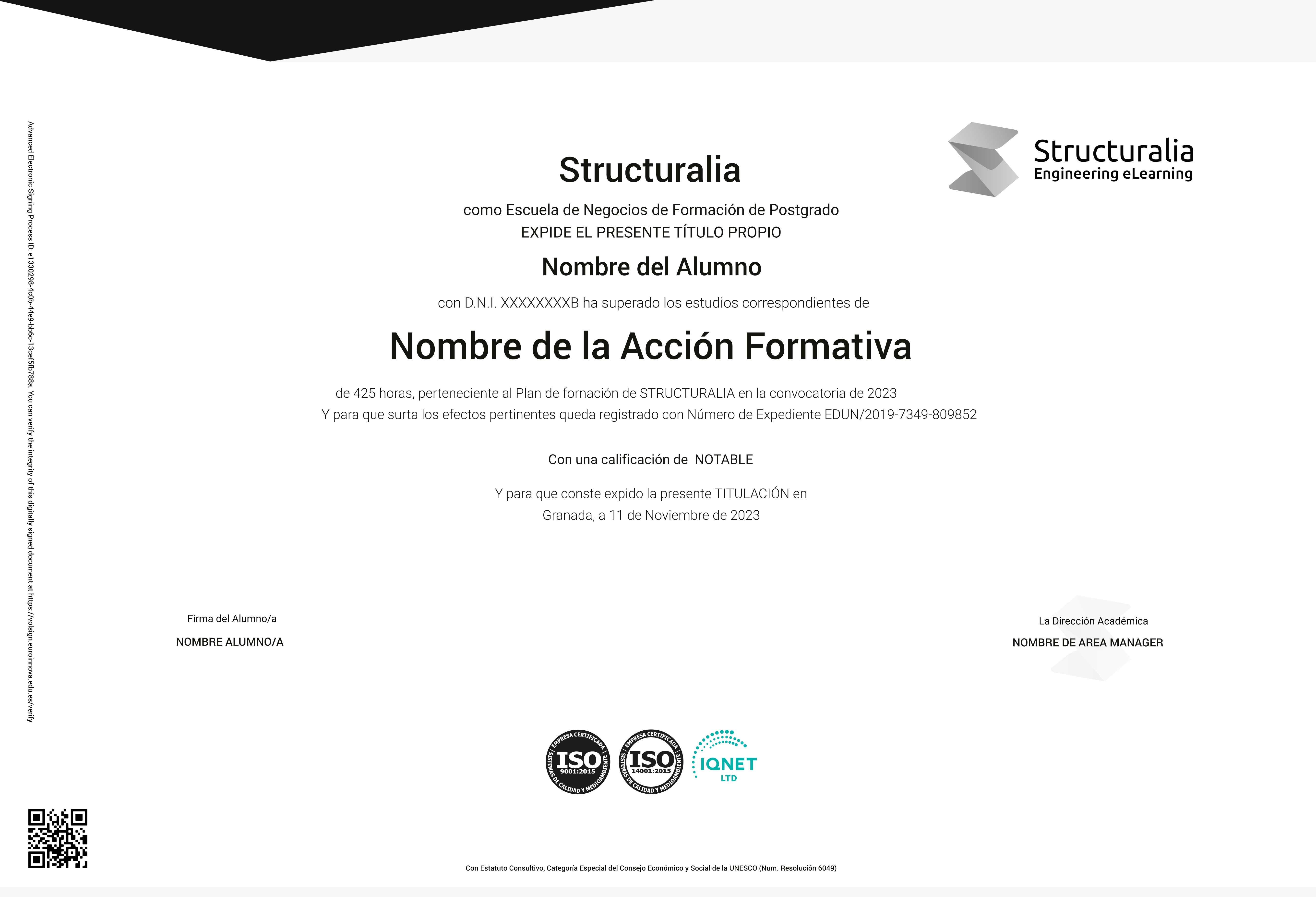Resumen salidas profesionales
This program is a compendium of the railway system as a whole. As a matter of fact, it provides knowledge about the entire life cycle of the railway system, from its initial project phases, through its construction process to its subsequent maintenance. It also clearly reflects the technological evolution in the railway field, the existing regulations, and the modern means of railway maintenance. Due to its comprehensive nature, this program goes into the different railway subsystems such as infrastructure, superstructure, power, signalling and telecommunications from both construction and maintenance perspectives, where each technique has its own material resources, construction procedures and specific maintenance. Furthermore, the Certificate program offers the opportunity to focus and specialize in two particularly attractive fields with a high degree of growth, such as high-speed and urban railway systems.
The general objective of this program is to build the student’s capacities in different technical and management-related disciplines that are necessary for the design, construction and maintenance of railway systems and structures.
The specific targets associated with this program are:
- Learn the aspects related to the management of railway line construction, as well as those related to the modernization of existing lines in terms of legal constraints, financing of infrastructures, environmental management, supplier relationship, etc.
- Learn the main specific parameters necessary to design and draft railway infrastructure projects, whether for conventional, high-speed, metro or tram lines.
- Address technical aspects related to civil works involved in the construction of railway infrastructures such as viaducts, tunnels, earthworks, leveling, etc.
- Learn the current specifications necessary for the design and construction of railway systems in relation to track superstructures, electrification, substations, signalling, communications, etc.
- Have extensive knowledge of crosscutting aspects of railway maintenance management, such as quality, environment, safety, railway maintenance models developed by different European countries.
- Study the different infrastructure and superstructure track maintenance techniques, weld inspection and maintenance, expansion device regulations, etc.
- Learn maintenance techniques applied to electrification installations such as the catenary, substations, grounding installations, etc.
- Analyze and apply knowledge of railway signalling system maintenance: CTCs, interlocks, blockades, automated level crossings, etc.
- Learn maintenance techniques applied to railway network telecommunications and information systems.
- In relation to each of the specialties (High-Speed or Urban Railways), their objectives is for the student to learn the specific particularities in the Design, Construction and Maintenance of railway infrastructures in these two fields.
Once the student completes this Certificate program, they will be able to apply for different positions within the railway field. There is a wide variety of professional opportunities related to railway design and construction, and infrastructure maintenance. In addition, other opportunities include project designer/author, railway specialist, railway technician, production manager, construction manager, technical assistance manager or construction manager, track technologist, railway consultant, maintenance base technician, maintenance manager, railway system auditor, etc. Bear in mind that these opportunities will also be based on previous qualifications and years of experience in the sector which, along with the different skills and knowledge of railway infrastructure, superstructure, power, telecommunications and signalling design, construction and maintenance acquired throughout this program, will be multiplied.
This certificate program equips you with the knowledge and skills needed for railway infrastructure design and construction. Upon completion, you will be able to manage railway projects effectively, design platforms, tunnels, bridges, and viaducts, as well as handle track layout, materials, and assembly. Additionally, you will understand railway electric traction, overhead contact lines, and energy subsystems for high-speed, metro, and tram systems.
This program is intended for technicians from different specialties who are interested in building their capacities in the design, construction, and maintenance of railway lines, civil engineers (Roads, canals and ports), civil work technical engineers, industrial engineers, technical industrial engineers, telecommunications engineers, etc.
More specifically, this program is intended for:
- Professionals with current or past experience in any of the different areas within the railway sector, who wish to acquire base knowledge and skills in order to join railway companies and related professional activities.
- Professionals with current or past experience in any of the different areas within the railway sector, who wish to acquire multi-disciplinary knowledge and skills above their current level or specialty.
Metodología
Aprendizaje 100% online
Plataforma web en la que se encuentra todo el contenido de la acción formativa. A través de ella podrá estudiar y comprender el temario mediante actividades prácticas, autoevaluaciones y una evaluación final.
Campus virtual
Accede al campus virtual desde cualquier dispositivo, las 24 horas del día. Contando con acceso ilimitado a los contenidos de este curso.
Equipo docente especializado
El alumnado cuenta con un equipo de profesionales en esta área de formación, ofreciéndole un acompañamiento personalizado.
Centro del estudiante
Contacta a través de teléfono, chat y/o email. Obtendrás una respuesta en un tiempo máximo de 24/48 horas en función de la carga docente.
Carácter oficial
La presente formación no está incluida dentro del ámbito de la formación oficial reglada (Educación Infantil, Educación Primaria, Educación Secundaria, Formación Profesional Oficial FP, Bachillerato, Grado Universitario, Master Oficial Universitario y Doctorado). Se trata por tanto de una formación complementaria y/o de especialización, dirigida a la adquisición de determinadas competencias, habilidades o aptitudes de índole profesional, pudiendo ser baremable como mérito en bolsas de trabajo y/o concursos oposición, siempre dentro del apartado de Formación Complementaria y/o Formación Continua siendo siempre imprescindible la revisión de los requisitos específicos de baremación de las bolsa de trabajo público en concreto a la que deseemos presentarnos.

















